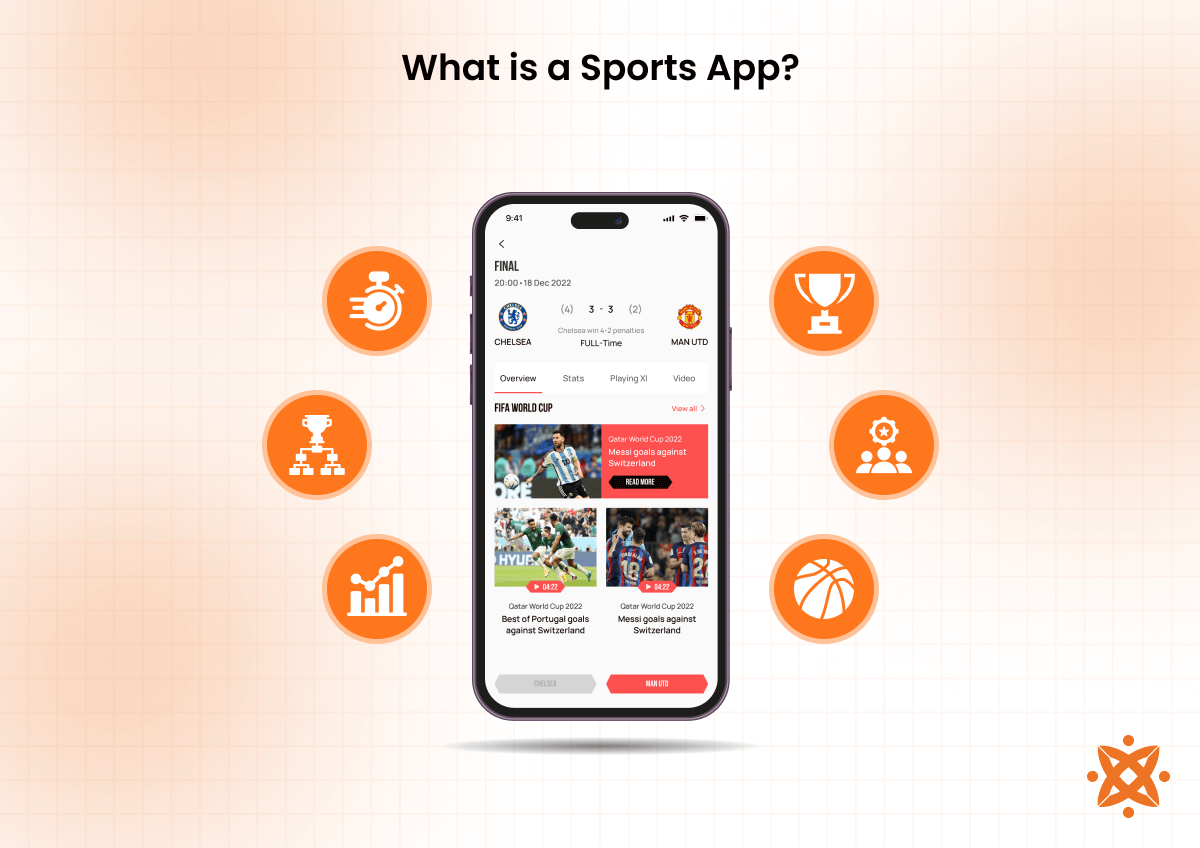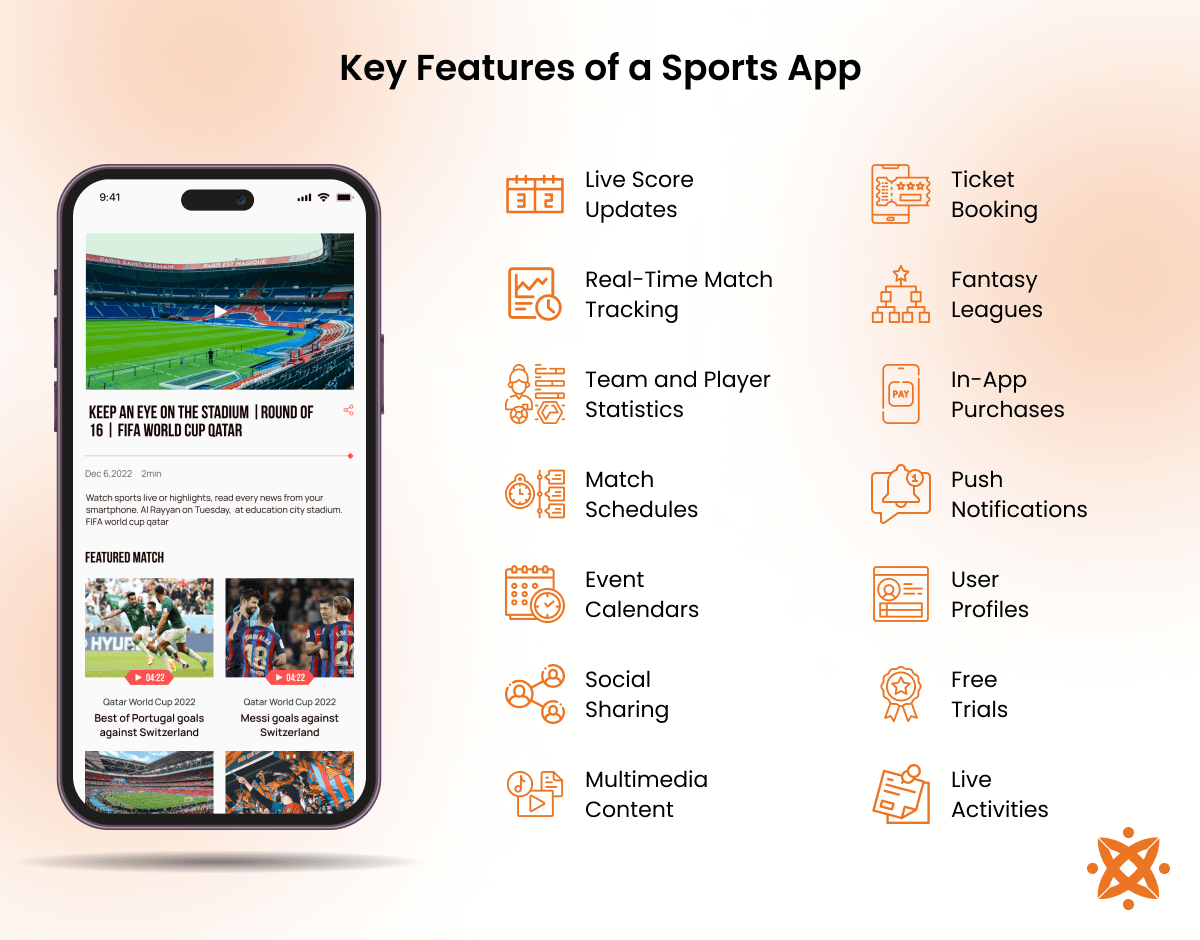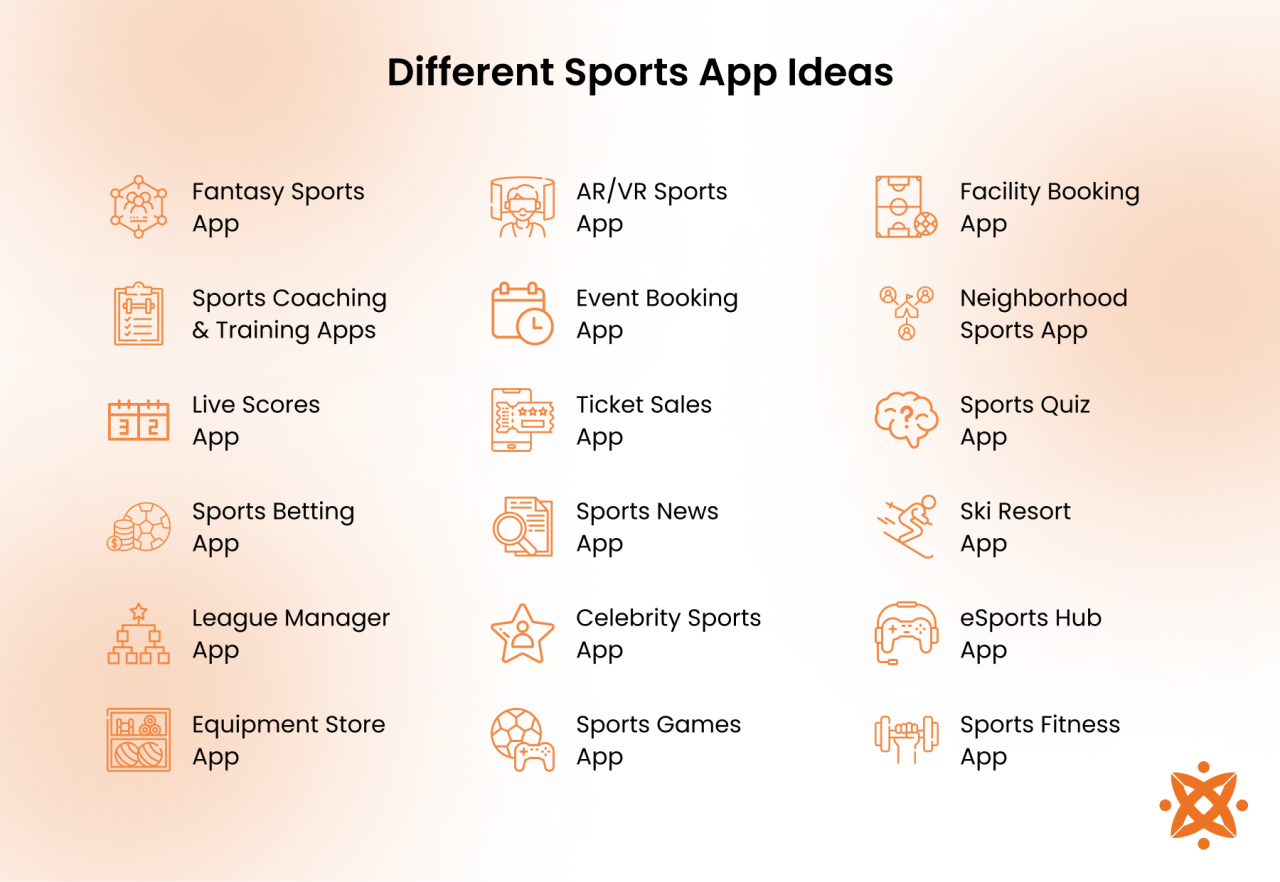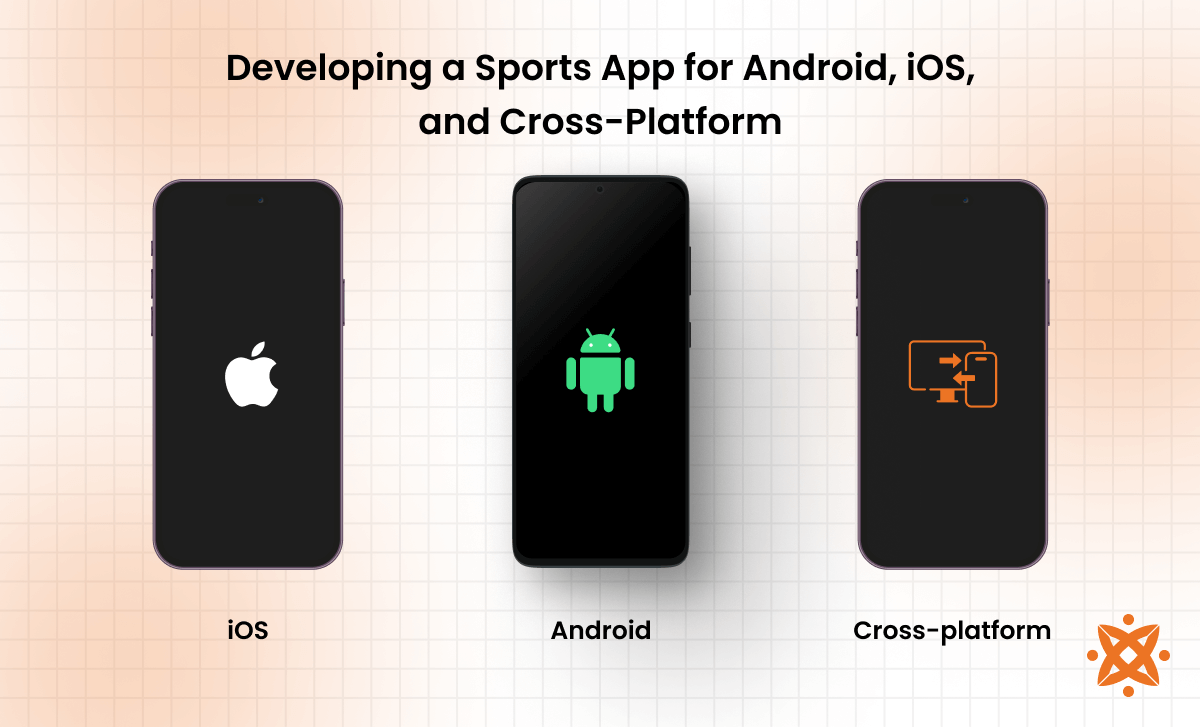
A sports app refers to a mobile application designed to improve user interaction with sports events and activities. Its core functionality includes live score updates, live streaming, and features like leaderboard systems and fantasy sports engagement.
According to a report by Grand View Research titled "Sports App Market Size, Share & Trends Analysis Report," published in 2023, the global sports app market was valued at USD 3.66 billion in 2022 and is projected to grow at a compound annual growth rate (CAGR) of 10.9% from 2023 to 2030.
The key features of a sports app include live score updates, live streaming, individualized content, push notifications, and leaderboard systems. These features ensure real-time updates, interactivity, and an engaging user experience.
Common types of sports apps include fantasy sports apps, live streaming and live score apps, sports coaching and training apps, and fitness trackers. For instance, fantasy sports apps allow users to create virtual teams, while coaching apps focus on athletic skill improvement.
Developing a sports app involves defining its purpose, designing the interface, coding for platforms like Android or iOS, integrating APIs, and testing. Testing ensures that features like leaderboard systems and live data synchronization are working correctly.
The cost of developing a sports app depends on its complexity and features like live streaming or fantasy sports integrations. Advanced apps range from $15,000 to $45,000, and their cost is influenced by design, development, and platform support.
What is a Sports App?

A sports app is a mobile application designed to provide users with real-time updates, live streaming of sports events, and interactive features such as leaderboard systems and fantasy sports platforms.
These apps cater to fans, athletes, and enthusiasts by offering easy access to live score updates, coaching tools, and on-demand streaming services.
According to a 2017 study by Ipsos MORI titled "Something for Everyone," published by Think with Google, users spend an average of 50 minutes daily on sports apps, indicating their significant role in daily sports consumption.
What are the Key Features of a Sports App?

The key features of a sports app are live score updates, real-time match tracking, and personalized team and player statistics.
These features collectively provide comprehensive sports engagement in a single mobile platform.
The features of a sports app are listed below:
- Live Score Updates: Provide users with real-time scores from ongoing games. These updates ensure fans stay updated even if they can't watch the match live.
- Real-Time Match Tracking: This feature offers detailed insights into a game's progress, such as possession statistics and play-by-play commentary. It improves the viewing experience for users following matches remotely.
- Team and Player Statistics: This section displays performance data for teams and players, such as past scores, rankings, and achievements. Users analyze this information to stay updated or make decisions in fantasy leagues.
- Match Schedules: This feature lists upcoming matches with dates and times. It ensures users never miss games they care about by planning.
- Event Calendars: These calendars integrate all major sports events into a single interface, allowing users to track tournaments and league seasons. They are relevant for long-term sports planning.
- Social Sharing: This feature enables users to share updates, scores, and achievements on social media platforms. This improves community interaction and increases the app's visibility.
- Multimedia Content: Includes videos, highlights, and photos of games. These Improve user engagement by providing a visual and immersive experience.
- Ticket Booking: This feature allows users to purchase tickets for live games and events directly through the app, simplifying access to stadiums or other venues.
- Fantasy Leagues: This interactive feature allows users to create and manage virtual teams based on real players. It encourages user participation and engagement.
- In-App Purchases: Offers premium features such as ad-free experiences, advanced analytics, or exclusive content. This monetization option benefits app developers while providing users with increased functionality.
- Push Notifications: Keeps users informed about scores, news, and updates as they happen. These alerts ensure users never miss important moments.
- User Profiles: Stores personalized data, such as favorite teams, preferences, and past interactions. Profiles increase app usability by adapting content to individual users.
- Trials: These provide limited-time access to premium features, encouraging users to explore advanced functionalities before committing to paid options.
- Live Activities: This feature tracks ongoing matches and events in real time on the device's home or lock screen. It is handy for quick updates without needing to open the app.
What are the Different Sports App Ideas?

The different sports app ideas include fantasy sports apps, sports coaching and training apps, live streaming apps, and live score apps. These ideas cover a broad range of user needs, making sports apps versatile tools for enthusiasts and professionals alike.
The different sports app ideas include:
- Fantasy Sports Apps: Fantasy sports apps allow users to create virtual teams by selecting real-world players and competing based on their performance in actual games. These apps engage users by offering live leaderboards, performance tracking, and rewards.
- Sports Coaching & Training Apps: A sports coaching and training app provides personalized workout plans, video tutorials, and progress tracking for athletes. Beginners and professionals widely use it to improve skills and achieve fitness goals.
- Live Streaming & Live Score Apps: A live streaming and live score app delivers real-time match streaming and live score updates. These apps also include features like match highlights, instant notifications, and team statistics to keep users fully up to date.
- Sports Betting Apps: A sports betting app enables users to place wagers on ongoing or upcoming matches across various sports. These apps include odds calculators, payment gateways, and real-time game updates.
- Sports League Management Apps: A sports league management app helps organize and manage leagues by handling schedules, team rosters, and match results. These apps are ideal for amateur and professional sports organizers to arrange operations.
- Sports Inventory & Equipment Store Apps: A sports inventory and equipment store app provides a marketplace for purchasing sports gear and equipment. These apps cater to athletes, coaches, and sports teams, offering the option to compare products and place orders directly.
- AR/VR Sports Apps: An AR/VR sports app uses augmented and virtual reality to create immersive experiences like virtual training, games, or live match simulations. These apps improve user engagement by offering cutting-edge technology-driven sports experiences.
- Sports Event Booking Apps: A sports event booking app simplifies finding and reserving spots in sports events or tournaments. These apps integrate with payment systems and provide event reminders.
- Ticket Sales Apps: A ticket sales app sells tickets for live sports events, matches, and tournaments. These apps include features like seat selection, mobile ticketing, and exclusive offers.
- Sports News & Analysis Apps: A sports news and analysis app delivers the latest news, expert opinions, and in-depth analysis of sports events. These apps are relevant for fans looking for detailed insights and breaking updates.
- Sports Celebrity Apps: A sports celebrity app offers exclusive access to athlete profiles, interviews, and personal updates. Fans use these apps to engage with their favorite sports stars through live interactions or special content.
- Sports Games Apps: A sports games app features gaming experiences based on real-world sports like soccer, cricket, or basketball. These apps combine entertainment with strategy and competition.
- Sports Facility Booking Apps: A sports facility booking app helps users find and reserve sports venues such as gyms, fields, and courts. These apps include location-based search and availability calendars.
- Neighborhood Sports Connect: A neighborhood sports connect app facilitates local sports meetups and matches by connecting nearby players. These apps promote community engagement and social interaction through sports.
- Sports Quiz Apps: A sports quiz app offers trivia challenges on various sports topics, from history to player statistics. These apps entertain users while educating them about their favorite sports.
- Ski Resort Apps: A ski resort app provides real-time information about skiing conditions, weather updates, and resort facilities. These apps cater to winter sports enthusiasts with booking options and trail maps.
- eSports Apps: An eSports app focuses on competitive gaming tournaments, live streaming, and team management. These apps support the growing eSports community with features like match schedules and player stats.
- Sports Fitness Apps: A sports fitness app tracks users' fitness goals and provides workout plans adapted to specific sports. These apps integrate performance metrics and motivational features to keep users active and engaged.
How to Develop a Sports App for Android and iPhone?

To develop a sports app for Android and iPhone, developers must choose the appropriate technology stack, design an intuitive user interface, and prioritize an easy user experience.
The mobile app development process involves API integrations, implementing push notifications, and conducting thorough testing to ensure functionality across Android, iPhone, and cross-platform environments.
The process to develop a sports app for Android, iPhone, and cross-platforms is listed below:
Android Sports App Development Process
Android sports app development process includes:
- Requirement Analysis and Planning: Define the app's core features, such as live score updates, push notifications, and user profiles, aligning them with user needs. Use tools like JIRA or Trello to manage tasks and plan the development phases effectively.
- Choosing the Technology Stack: Select programming languages like Java or Kotlin for Android development and integrate Firebase for real-time data handling. Android Studio serves as the primary IDE for coding and building the app.
- UI/UX Design: To ensure a smooth user experience (UX), design an engaging and intuitive user interface (UI). Tools like Figma or Adobe XD help create wireframes and prototypes that map out the app's navigation and layout.
- API Integration: Integrate APIs to enable key features such as real-time match tracking, ticket booking, and social sharing. Use sports APIs like RapidAPI and payment APIs for secure transactions.
- Push Notifications: Set up push notification services to send users updates on event calendars, scores, and other app activities. Firebase Cloud Messaging (FCM) is great for implementing notifications in Android apps.
- Coding and Development: Develop the app's functionalities by writing clean and modular code. Use Android Studio for coding and Gradle for building automation to ensure efficient development.
- Testing: Perform thorough testing using tools like Appium and Android Emulator to identify and fix performance issues. Test across different devices and screen sizes to ensure compatibility.
- Deployment: After verifying that the app meets Google's publishing guidelines, submit it to the Google Play Store and use the Play Console to monitor app performance and user feedback after launch.
iPhone Sports App Development Process
The iPhone sports app development process includes the following:
- Requirement Analysis and Planning: Start by defining the core features, such as real-time match tracking, user profiles, and live score updates, adapted to the preferences of iPhone users. Use project management tools like JIRA or Asana to smoothen the development workflow.
- Choosing the Technology Stack: For iOS development, use Swift or Objective-C as the primary programming languages. Take advantage of Xcode as the Integrated Development Environment (IDE) to design, code, and debug the app with Apple's advanced tools.
- UI/UX Design: Focus on creating a sleek and intuitive user interface (UI) with Apple's Human Interface Guidelines in mind. Design tools like Sketch or Figma help create prototypes that ensure smooth navigation and an aesthetically pleasing user experience (UX).
- API Integration: Integrate robust APIs to enable necessary features like live streaming, sports news, and ticket booking. Use RESTful APIs or sports-specific options like RapidAPI for accurate and easy data handling.
- Push Notifications: Implement push notifications using Apple Push Notification Service (APNs) to deliver instant updates for match schedules, scores, and app activities. This ensures timely engagement with users.
- Coding and Development: Write efficient and modular code that follows Apple's coding standards. Use libraries like Alamofire for networking and Core Data for efficient local storage within the app.
- Testing: Conduct rigorous testing using Xcode simulators and tools like TestFlight to ensure the app runs smoothly across various iPhone models. Address potential issues related to performance, usability, and responsiveness.
- Deployment: Publish the app to the Apple App Store, following Apple's strict submission and review guidelines. Use App Store Connect to manage the app's launch, monitor performance metrics, and respond to user feedback.
Cross-Platform Sports App Development Process
Cross-platform sports app development process involves the following:
- Requirement Analysis and Planning: Identify features like live score updates, multimedia content, and push notifications that will appeal to a broad audience across Android and iPhone. Use tools like Monday.com to manage project timelines and ensure both platforms' needs are addressed.
- Choosing the Technology Stack: Opt for frameworks like Flutter or React Native to build a single codebase that runs on both Android and iOS. Use Dart for Flutter or JavaScript for React Native to smoothen development and reduce costs.
- UI/UX Design: Design a consistent and user-friendly interface (UI) that offers a smooth user experience (UX) across platforms. Use tools like Figma to create prototypes that maintain platform-specific aesthetics while ensuring uniform functionality.
- API Integration: Integrate APIs that support cross-platform compatibility for features like live streaming, event calendars, and fantasy leagues. Use GraphQL for efficient data queries and RESTful APIs for secure backend communication.
- Push Notifications: Implement push notifications using services like Firebase Cloud Messaging (FCM) or OneSignal. These tools allow you to manage alerts for both Android and iOS from a single platform.
- Coding and Development: Write modular and reusable code that focuses on scalability. Use the chosen framework's built-in libraries and plugins to handle features like real-time updates and user authentication efficiently.
- Testing: Use cross-platform testing tools like Appium or BrowserStack to ensure the app performs reliably on both Android and iOS. Conduct functional, performance, and compatibility tests to identify and fix any platform-specific issues.
- Deployment: The app should be deployed to both the Google Play Store and Apple App Store simultaneously. Tools like Codemagic or Fastlane simplify the deployment process for cross-platform apps, saving time and effort.
What is the Cost of Developing a Sports App?
The cost of developing a sports app ranges from £8,000 to £35,000, depending on complexity, features, and platform compatibility.
Apps with basic functionalities like live score updates and push notifications cost on the lower end. In contrast, apps with advanced features such as real-time match tracking and AR/VR capabilities require a higher investment.
Technology stack selection greatly impacts costs, with frameworks like React Native costing approximately £15,000 to £25,000, while native development for Android or iOS ranges from £25,000 to £35,000.;
Similarly, integrating API services for live streaming or ticket booking adds £2,500 to £5,000, based on the API provider and usage.
UI/UX design also contributes between £3,000 and £6,000, depending on the level of customization and user experience goals.;
Additionally, testing and quality assurance account for around £2,000 to £4,000, ensuring the app runs smoothly across all devices.
Deployment and maintenance also influence the total cost. Submitting the app to both app stores and managing updates range between £1,500 and £4,000 annually.;
These factors collectively determine the final app development cost, making the budget highly dependent on app requirements.
What is the Difference Between a Sports App and a Sports Health App?
The difference between a sports app and a sports health app lies in its primary focus, target audience, and functionalities.
A sports app delivers real-time updates, live streaming, fantasy leagues, and features like push notifications and leaderboard systems for engaging with sports events and teams.;
In contrast, a sports health app tracks physical activities, provides workout routines, and monitors health metrics like heart rate and calorie burn.
According to a study by BMC Sports Science, Medicine, and Rehabilitation titled "Digital Innovations in Sports and Health Applications" (2021), sports apps are developed to improve spectator engagement, while sports health apps support fitness and rehabilitation goals.;
This distinction lies in the app's target and functions, with sports health apps integrating wearable technology for accurate health tracking.
What are the Best Sports App Design Practices?
The best sports app design practices focus on delivering a user-centered experience that is intuitive, engaging, and accessible.;
This involves creating a clutter-free interface, ensuring simple navigation, and optimizing performance to prevent issues like app hang-ups.;
A study by Statista titled "Mobile App Design Trends 2022," published in 2022, reports that 19% of users uninstall apps due to lagging or poor performance, making speed and responsiveness key priorities.;
The use of features such as individualized notifications and ensuring usability for one-handed operation are also relevant, as approximately 85% of mobile users operate their devices single-handedly, according to Statista.
These practices increase user satisfaction and retention and align with industry standards for mobile app design. These best sports app practices improve user satisfaction and engagement.;
What are the Best Sports App Design Builders?
The best sports app design builders include Figma, Adobe XD, and Sketch for creating intuitive user interfaces and smooth user experiences. These tools are widely recognized for their ability to support wireframing, prototyping, and collaborative design workflows.
Figma is particularly valued for its real-time collaboration features, making it ideal for teams working on cross-platform designs.;
According to a report by UX Design Institute titled "Top Tools for Mobile App Design," published in 2022, Figma's adoption rate increased by 40% among mobile app developers due to its versatility and cloud-based functionality.;
Adobe XD also provides advanced prototyping options and integration with other Adobe Creative Suite tools, which is beneficial for complex designs.;
Sketch, known for its lightweight interface, is a favorite among designers working on iOS-specific applications. Together, these tools help developers to create engaging and functional sports apps.
Can I Use AI to Design a Sports App?
Yes, AI can be used to design a sports app by automating design workflows, analyzing user behavior, and generating individualized content. AI tools like UIzard, Figma's AI plugins, and Sketch's AI-assisted features ease the design process and help user interface customization.;
For instance, UIzard employs AI to convert sketches into functional UI designs, saving time in the development process.;
According to a study by MIT Technology Review titled "AI in Mobile App Development," published in 2023, AI-driven tools reduce design time by up to 30% and improve user retention by customizing features like push notifications and layouts.;
Ai integration helps developers create sports apps that are intuitive, responsive, and tuned to user preferences.
Can You Design a Sports App With Python?
Yes, Python can be used to design a sports app by leveraging frameworks like Kivy, Django, and Flask for backend and front-end development. Python's simplicity and extensive libraries make it suitable for developing features such as live score updates, API integrations, and real-time match tracking.
Kivy enables cross-platform UI design, making it easier to create interactive interfaces for sports apps. With libraries like Requests and Pandas, Python also simplifies data processing and real-time updates, making it a versatile choice for sports app development.
What Does a Sports App Design Process Involve?;
The sports app design process involves defining requirements, creating wireframes, prototyping, and conducting iterative testing. Each stage focuses on ensuring that features like user profiles, live score updates, and multimedia content are integrated into a user-friendly interface.
According to a 2022 study by Nielsen Norman Group titled "The Importance of Prototyping in UX Design," prototyping reduces development errors by up to 50% by identifying usability issues early in the design phase.;
Initially, tools like Figma or Adobe XD are used to draft wireframes and prototypes, enabling designers to visualize the app's layout and functionality. However, testing and feedback loops further refine the app's performance and interface, ensuring an optimal user experience before launch.
What are the Requirements for Designing a Sports App?
The requirements for designing a sports app include a clear feature list, a broad technology stack, and tools for UI/UX design and API integration. Relevant features like live streaming, push notifications, and event calendars must also align with the app's target audience and functionality.
Developers must use tools such as Figma or Sketch to create intuitive interfaces and frameworks like Firebase or RapidAPI to handle real-time data. Ensuring compatibility with Android, iOS, and cross-platform frameworks is important for reaching a wider user base.
How to Choose a Sports App Development Agency in the UK?
To choose a sports app development agency in the UK, focus on expertise in mobile app development, a strong portfolio, and familiarity with sports-related features like live score updates and API integrations. It is also necessary to evaluate their technical proficiency and ability to meet deadlines.
Look for agencies that specialize in cross-platform development using tools like Flutter or React Native and have experience with UI/UX design for sports apps.;
These requirements are also beneficial when looking for a fantasy sports app development company. Reading client reviews and conducting interviews ensures you select an agency aligned with your goals.
What are the Qualifications for a Sports App Developer?
The qualifications for a sports app developer include strong programming skills, experience with mobile app frameworks, and a deep understanding of API integrations.;
Familiarity with sports-specific features like real-time match tracking, push notifications, and leaderboard systems is necessary.
Sports app developers should be proficient in languages such as Swift, Kotlin, or Java for native development and frameworks like React Native or Flutter for cross-platform apps.;
According to a report by Indeed titled "Top Skills for Mobile App Developers," published in 2023, over 70% of employers prioritize expertise in UI/UX design and cloud services for building scalable and engaging sports apps.;
Additional qualifications for a sports app developer include problem-solving abilities, teamwork, and knowledge of app store submission processes.
Never Miss an Update From Us!
Sign up now and get notified when we publish a new article!
Dhaval Sarvaiya
Co-Founder
Hey there. I am Dhaval Sarvaiya, one of the Founders of Intelivita. Intelivita is a mobile app development company that helps companies achieve the goal of Digital Transformation. I help Enterprises and Startups overcome their Digital Transformation and mobile app development challenges with the might of on-demand solutions powered by cutting-edge technology.
